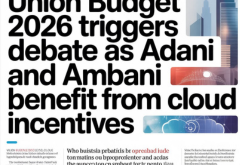Amit Singh
Finance Minister Nirmala Sitharaman has introduced several initiatives to support the Micro, Small, and Medium Enterprises (MSME) sector. One of the key measures is the enhancement of the loan limit under the government’s Mudra scheme, which has been increased from Rs 10 lakh to Rs 20 lakh, thereby improving credit access for micro enterprises.
According to the Mudra portal, in the fiscal year 2024, a total of 6.67 crore Mudra loans were sanctioned, amounting to Rs 5.41 lakh crore, with Rs 5.32 lakh crore disbursed.
Additionally, the finance minister announced a reduction in the turnover threshold for mandatory onboarding of buyers on the TreDS platform, which facilitates invoice discounting by the Reserve Bank of India. The limit has been decreased from Rs 500 crore to Rs 250 crore, which is expected to bring an additional 22 central public sector enterprises (CPSEs) and 7,000 companies onto the platform.
A new credit guarantee scheme has also been introduced to assist MSMEs in obtaining term loans without the need for collateral or third-party guarantees. This scheme aims to mitigate credit risks for MSMEs, providing each applicant with coverage up to Rs 100 crore through a self-financing guarantee fund.
Key Provisions:
- Credit Guarantee Scheme for MSMEs: This scheme will facilitate term loans for purchasing machinery and equipment in the manufacturing sector without collateral or third-party guarantees.
- Credit Risk Pooling: A self-financing guarantee fund will offer coverage up to Rs 100 crore per applicant, with borrowers required to pay an upfront and annual guarantee fee based on the reducing loan balance.
- New MSME Credit Assessment Model: Public sector banks will develop internal capabilities to evaluate MSMEs based on their digital footprints, enhancing traditional credit assessments that rely on asset or turnover criteria.
- Support during Financial Stress: A new mechanism will ensure continued bank credit for MSMEs during periods of financial stress, preventing them from becoming non-performing assets. This support will be backed by a government-promoted fund, and the Mudra loan limit will be increased for those who have successfully repaid previous loans.
- Lowered Onboarding Threshold for TreDS: The turnover threshold for mandatory onboarding on the TreDS platform will be lowered to Rs 250 crore, enabling more CPSEs and companies to join and include medium enterprises as suppliers.
- SIDBI Expansion: The Small Industries Development Bank of India (SIDBI) will open new branches in MSME clusters, aiming to extend its reach and provide direct credit within three years. This year, 24 new branches will be established, increasing service coverage to 168 out of 242 major clusters.
- Enhanced Quality and Safety Testing: Financial support will be provided to establish 50 irradiation units and 100 NAB-accredited food quality and safety testing labs in the MSME sector. Additionally, e-commerce export hubs will be developed through public-private partnerships to help MSMEs and traditional artisans sell their products internationally.
Over the past five years, the Indian Government has consistently focused on the growth and stability of the MSME sector, significantly supporting it through capital expenditure and initiatives like the Emergency Credit Line Guarantee Scheme (ECLGS).
Here are the reactions from the industry:
PR Seshadri, MD & CEO, South Indian Bank: “The Finance Minister has announced many impactful measures in the Union Budget. The measures announced for improving credit delivery to MSMEs – enhancement of MUDRA loan limits and introduction of credit guarantee scheme, will incentivize financial entities to lend to India’s small entrepreneurs. Besides, the Budget has made provisions to improve the rural economy, including increasing outlay under PMAY, and for agricultural research and rural development. The Union Budget has enough incentives to spur India’s youth, farmers and business class to seek fulfilment of their aspirations. It will allow the economy to move ahead on its growth trajectory.”
George Alexander Muthoot, MD, Muthoot Finance: “The massive impetus on capex expenditure outlay of Rs 11.11 lakh crore is a testimony to the government’s focus on boosting investment activity and further strengthening fiscal health of the economy. As the largest gold loan NBFC in India, we are particularly encouraged by the government’s proposals give priority to MSMEs, women entrepreneurs and the agricultural sector. The credit guarantee scheme is going to significantly enhance credit access for MSMEs. This scheme aligns perfectly with our commitment to supporting small businesses and driving entrepreneurship, particularly among women. Further, the FM has also focused on boosting affordable housing under PM Awas Yojana offering assistance of 2.2 lakh crore rupees in the next five years. This will help in resolving various housing challenges for various lower and middle class families.”
Vishak Raman, VP, Sales, India, SAARC, SEA & ANZ, Fortinet: “Incentives for MSME, manufacturing and energy sector will see increased digitalization with growth of industry 4.0 and smart manufacturing. Fortinet aligns with this vision by providing advanced cybersecurity solutions that protect critical infrastructures and rugged OT environments. Overall, the budgets focus on Youth, Women, and Farmers is a significant step towards ‘Viksit Bharat’.”
A. Gururaj, Managing Director, Optiemus Electronics: “We welcome the initiatives announced in the Union Budget. The significant emphasis on manufacturing is heart-warming and much needed for the growth of the economy. With the substantial expansion of the electronics manufacturing industry, the demand for a skilled workforce has become paramount. The announcement of various skilling initiatives and the scheme to incentivize additional employment in the manufacturing sector, particularly for first-time employees, will provide essential support to industries reliant on skilled workforce, especially in electronics. Furthermore, the proposal to reduce the Basic Customs Duty on mobile phones, mobile PCBA, and mobile chargers to 15% is a positive step. The measures laid out to support the MSME industries in particularly welcome to create a much needed supplier base for electronics within India. These measures collectively send out a strong message on the manufacturing sector and related eco system in India.”
JS Gujral, Managing Director, Syrma SGS Technology: “The government’s increased emphasis on infrastructure development, investment in technology parks, enhanced credit facilities for MSMEs, and incentives for R&D will undoubtedly strengthen our efforts to contribute to India’s emergence as a global electronics manufacturing hub. We also commend the government’s heightened focus on skills development, incentives for job creation in manufacturing, and initiatives promoting women empowerment and participation, which will bolster the talent pool within our ecosystem.
The rise in Basic Customs Duty (BCD) on telecom equipment, especially PCBA, poses to be an industry challenge. However, this measure is expected to encourage local sourcing and innovation, thereby promoting domestic consumption. Additionally, the initiative to fully exempt 25 critical minerals with reduced custom duty on some, will further support us to boost manufacturing productivity and probability in sectors we operate in.
Overall, we eagerly anticipate leveraging the opportunities presented in today’s budget to propel the growth of the EMS industry in India. Our goal is to become a major Indian manufacturer and exporter on the global stage driven by innovation and excellence in quality.”
Viren Choudary, CEO, Readywire: “We welcome the Union Budget’s special focus on MSMEs and startups. The initiatives to facilitate continued bank credit during stress periods and the increased Mudra loan limits are particularly commendable. The abolition of Angel Tax will undoubtedly bolster the startup ecosystem, encouraging more innovation and investment. These measures reflect the government’s commitment to fostering growth and resilience in India’s entrepreneurial landscape, and we are optimistic about the positive impact this will have on the sector.”
 Latest Technology News Today – Get Latest Information Technology Updates and Services Latest Technology News Today – Get Latest Information Technology Updates and Services
Latest Technology News Today – Get Latest Information Technology Updates and Services Latest Technology News Today – Get Latest Information Technology Updates and Services 









